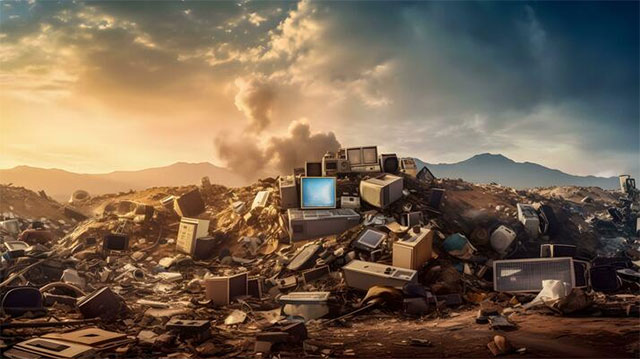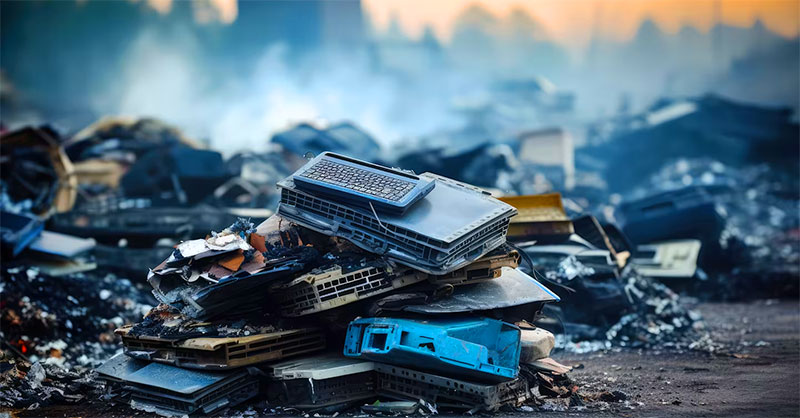Discontinuing support for Windows 10 could cause large amounts of e-waste
Windows 11 does not directly cause e-waste, but the operating system's hardware requirements will increase the amount of e-waste. Analyst Kieren Jessop from Canalys said that about 20% of devices globally cannot be upgraded to Windows 11 because they do not meet hardware needs. And Microsoft will stop supporting this operating system in October 2025, and this will push users and businesses to buy new devices.
It is estimated that about 240 million PCs running Windows 10 will become electronic waste when Microsoft stops supporting this operating system. While these PCs are recyclable, their incompatibility with Windows 11 reduces their value for resale and recycling. Plus the lack of security updates will reduce demand for devices that are no longer supported.

Jessop's colleague Ben Caddy said organizations using Windows 10 PCs will be pushed to retire devices soon when Microsoft stops support, especially security updates. Although Microsoft offers an Extended Security Update program, the high price makes extending the life of Windows 10 devices less attractive.
Benefits for landfills
'Companies like their devices to always be provided with updates with new security and features,' says Jacob Kalvo, CEO of Live Proxies, a proxy solutions provider based in Studio City, California. most, so even when functional, older hardware is considered obsolete."
He also explained that Microsoft increased hardware requirements for Windows 11, causing many PCs to be at risk of being shelved even though they still work well. Demand for new PCs will increase due to the end of support for Windows 10 and demand during the Covid period. A Canalys survey found that 73% of channel partners expect the end of Windows 10 support to impact customer refresh plans over the next 12 months.

Even if Microsoft continues to support Windows 10, the development of AI also makes the hardware running Windows 10 obsolete. On-device AI inference offers many advantages, but older PCs will not be able to run AI applications effectively.
Solution to extend hardware life
Russ Ernst from Blancco Technology Group said companies are trying to extend the life of their hardware. One way to do this is to 'tier', which is to move the machine from parts with high system requirements to parts with lower system requirements.

The scale of e-waste from the end of support for Windows 10 highlights the role that device and operating system vendors play in maximizing product longevity. OEMs need to design products that are durable and easy to repair and recycle, and operating system vendors need to ensure devices are usable and secure for as long as possible.
While suppliers have a role to play in reducing e-waste, responsibility is shared between manufacturers, consumers and policymakers. PC AI has prompted many vendors to launch marketing campaigns focused on AI and the sustainability of new hardware.
Caddy believes that the lifespan of equipment depends on the consumer's purchasing and replacement cycle, as well as the organization's IT equipment procurement cycle. PC vendors need to ensure devices operate efficiently over the long term, and operating system vendors need to support devices as long as possible to avoid premature retirement of devices.
You should read it
- Windows revolution and breakthrough changes through each version
- Summary of several logout methods on Windows 8 and Windows 10
- Looking back at 27 years of 'evolution' of Windows
- Instructions on how to upgrade from Windows XP to Windows 8
- 4 ways to 'revive' Windows XP on Windows 10
- What is Windows Hello? How does Windows Hello work? How to install Windows Hello
 Top 5+ Ways to fix when iPhone cannot turn on, access instructions
Top 5+ Ways to fix when iPhone cannot turn on, access instructions The download speed of the Starlink satellite network system reaches more than 8Gbps
The download speed of the Starlink satellite network system reaches more than 8Gbps How to enter BIOS (UEFI) on Windows 10, how to fix the error of not being able to enter BIOS Win 10
How to enter BIOS (UEFI) on Windows 10, how to fix the error of not being able to enter BIOS Win 10 Tinder integrates a new AI tool to automatically select the most suitable profile photo for users
Tinder integrates a new AI tool to automatically select the most suitable profile photo for users G.Skill Trident Z5 Royal Neo DDR5 launched: Supports AMD EXPO, up to DDR5-8000, ready for Ryzen 9000 CPU series
G.Skill Trident Z5 Royal Neo DDR5 launched: Supports AMD EXPO, up to DDR5-8000, ready for Ryzen 9000 CPU series The super jailbreak tool Cellebrite 'fails' with iPhones with iOS 17.4 or higher
The super jailbreak tool Cellebrite 'fails' with iPhones with iOS 17.4 or higher